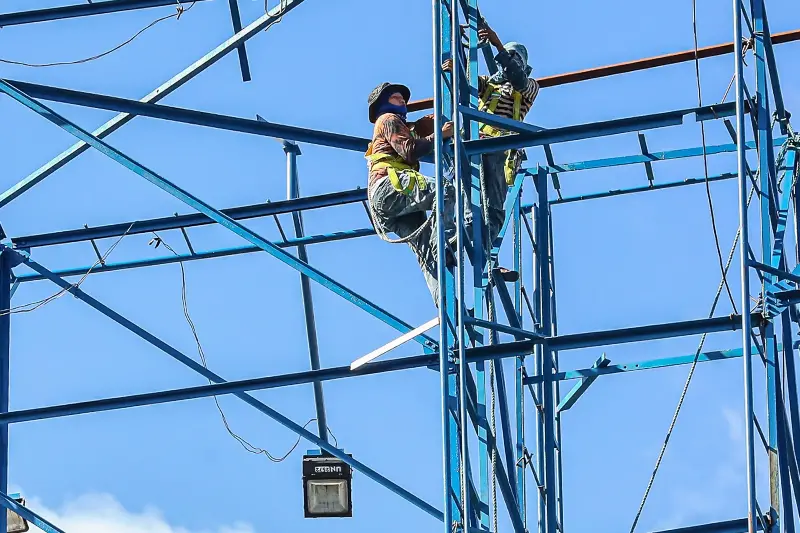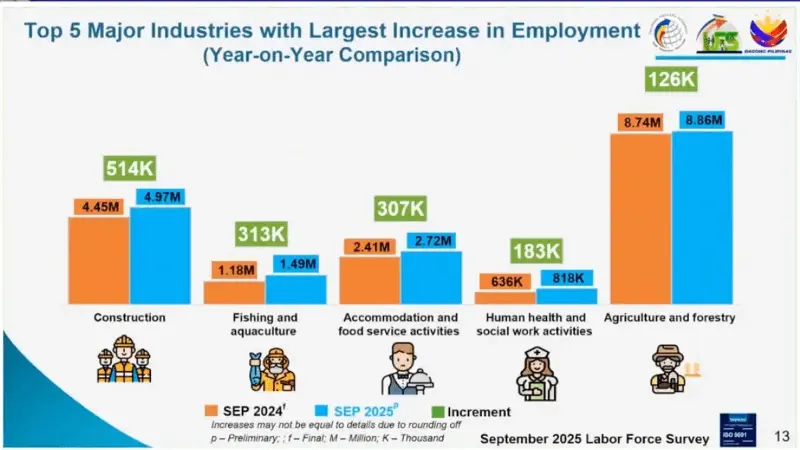
MANILA, Philippines – Unemployment improved for a second consecutive month to 3.8% in September as the construction industry added more jobs to the economy, the Philippine Statistics Authority (PSA) said on Thursday, November 6.
The latest jobless rate translates to around 1.96 million Filipinos. This is lower than the 3.9% or 2.03 million jobless Filipinos tallied in August but higher than the 3.7% or 1.89 million unemployed Filipinos in September 2024.
Meanwhile, underemployment worsened in September at 11.1% or 5.52 million Filipinos. This is higher than the 10.7% or 5.38 million underemployed Filipinos in August, but lower than the 11.9% or 5.94 million underemployed Filipinos in August.
The construction sector saw the largest increase in employment in September, adding 514,000 jobs since September 2024.
National Statistician Dennis Mapa highlighted gains in the jobs related to the construction of buildings, plumbing, and air conditioning installation, as well as the construction of utility projects.

However, Mapa noted that the construction sector was also one of the reasons why underemployment figures increased. This means the jobs added to the sector may only be temporary ones.
“So posible na may mga workers, but a number or a portion of the workers hindi nagkaroon ng 40-hour job. Some of them are hired, let’s say, as a temporary hand or partial lang ‘yung kanilang work done in that particular week,” he explained.
(So it’s possible that there are workers, but a number or a portion of the workers are not working 40 hours a week. Some of them are hired, let’s say, as a temporary hand or their work was only partially done in that particular week.)
Mapa added that the flood control scandal might have contributed to the month-on-month reduction of construction jobs. The Department of Public Works and Highways paused bidding for infrastructure projects for nearly two weeks in September.
As for job losses, the PSA found that other service activities such as domestic work (-493,000 jobs) shed the most jobs in September.
Mapa said the shedding of jobs in domestic work is often tied to household income. He noticed that jobs in domestic work are often added when households make more money.
The manufacturing sector also continued to bleed jobs as the industry contracted for the first time in six months in September, according to data from the Standard & Poor’s (S&P) Purchasing Managers Index.
“New orders and output decreased slightly as firms mentioned a fall in client numbers and a modest drop in production from the suspension of rice imports,” S&P Global Market Intelligence senior economist David Owen said.
‘Resilient’ job market
The Department of Economy, Planning, and Development (DEPDev) said the latest job figures reflect the Philippine labor market’s “resilience” despite headwinds.
DEPDev Secretary Arsenio Balisacan underscored the importance of implementing interventions to create more stable, high-quality jobs for the informal sector and the youth. The country’s chief economist cited the recent passage of the Lifelong Learning Development Framework Act, which creates a system for continuing education.
“Ensuring the timely release of its implementing rules and regulations is a priority. The government must also actively communicate the policy, particularly to local government units, which will play a key role in promoting lifelong learning,” Balisacan said. – Rappler.com
